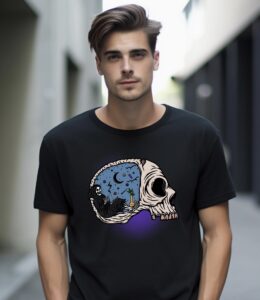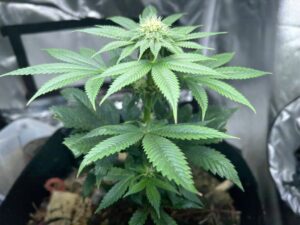The psychoactive effects of cannabis, often described as a “high,” are primarily attributed to the compound tetrahydrocannabinol, commonly known as THC. But how does this compound journey from being part of a plant to causing effects in the human brain? This article will explore the fascinating lifecycle of THC, from its synthesis in the cannabis plant to its interaction with the human body, leading to the psychoactive effects many people experience.

THC Synthesis in the Cannabis Plant
Cannabis plants produce THC through a complex biochemical process. The compound starts as cannabigerolic acid (CBGA), which is converted into tetrahydrocannabinolic acid (THCA) through enzymatic reactions. THCA is the non-psychoactive precursor to THC. If you’re interested in the botanical aspects of cannabis, the Punchkins – Can’t We All Just Get a Bong? Bong Plushie offers a humorous take on cannabis culture, making it a fun addition to any enthusiast’s collection.
Decarboxylation: Activation of THC
THCA becomes THC through a process called decarboxylation, which occurs when the cannabis is exposed to heat. This is why cannabis must be smoked, vaporized, or cooked to activate its psychoactive properties. For those who enjoy a social smoking experience, the GRENAOH 22″ Premium Hookah Shisha Set provides a communal way to enjoy cannabis, complete with a ceramic bowl and coal tongs ashtray.
Absorption and Distribution
Once inhaled or ingested, THC enters the bloodstream and is distributed throughout the body, including the brain. The compound is fat-soluble, meaning it can cross the blood-brain barrier, a selective membrane that protects the brain from harmful substances.
Interaction with the Endocannabinoid System
THC primarily interacts with the endocannabinoid system (ECS) in the human body, specifically binding to CB1 receptors found in the brain. This interaction leads to various psychoactive effects, including altered perception, euphoria, and increased appetite. If you’re looking to add some fun to your cannabis sessions, the Cheech & Chong Spin the Bong Game offers an entertaining way to enjoy cannabis with friends, complete with card and bong commands for blissful playtime.
The Role of Metabolism
After exerting its effects, THC is metabolized by the liver into various metabolites, including 11-hydroxy-THC, which is also psychoactive and extends the duration of the high. These metabolites are eventually excreted from the body, primarily through urine.
Factors Influencing THC Effects
The effects of THC can vary widely among individuals due to factors like metabolism rate, frequency of use, and the presence of other compounds in the cannabis strain. For example, the terpenes in cannabis can modulate the effects of THC, either amplifying or mitigating its psychoactive properties.
Therapeutic Applications
Beyond its recreational use, THC has several therapeutic applications. It’s used medically for conditions like chronic pain, nausea, and appetite loss. Its interaction with the ECS allows it to offer relief in a variety of medical contexts.
The lifecycle of THC is a complex journey that starts in the cannabis plant and ends in the human brain, inducing a range of psychoactive effects. This journey involves multiple biochemical processes, from synthesis and decarboxylation to absorption and metabolism. Understanding the lifecycle of THC can deepen our appreciation for its complexity and versatility, whether we’re using it for recreational or medicinal purposes. The experience can be further enriched by incorporating social elements like games or communal smoking sessions, making the world of cannabis as diverse as the plant itself.
The Social and Cultural Impact of THC
The influence of THC extends beyond its biochemical interactions with the human body. It has a significant social and cultural impact, shaping attitudes, laws, and even art forms. The use of cannabis and its psychoactive effects have been celebrated, criticized, and debated in various social circles.
The Legal Landscape
The legal status of THC varies globally, with some countries adopting a more liberal stance and others maintaining strict prohibitions. In the United States, for example, cannabis is legal for recreational use in several states, while it remains illegal at the federal level. This complex legal landscape reflects the ongoing debate about the risks and benefits of THC consumption.
Artistic Inspiration
Many artists and musicians have cited THC as a source of inspiration, claiming that its psychoactive effects help them tap into deeper levels of creativity. From the jazz musicians of the early 20th century to modern-day rappers and visual artists, THC has found its way into various art forms, influencing style, tone, and content.
Social Gatherings and Rituals
Cannabis has been used in social settings for centuries, from Rastafarian rituals to modern-day cannabis cafes. The psychoactive effects of THC often play a role in social bonding, facilitating conversation and shared experiences. If you’re looking to make your social gatherings more entertaining, the Cheech & Chong Spin the Bong Game offers a unique way to enjoy cannabis with friends, adding a playful twist to your sessions.
The Future of THC: Research and Innovations
As our understanding of THC continues to grow, so does the scope for its application. Ongoing research is exploring its potential use in treating a range of medical conditions, from mental health disorders like PTSD and anxiety to physical ailments like epilepsy and multiple sclerosis.
Technological Advances
Advancements in technology are also shaping the way we consume THC. Vaporizers, edibles, and even transdermal patches offer new methods of consumption, each with its own set of advantages and drawbacks. For those who enjoy the traditional method of smoking but are looking for a modern twist, the GRENAOH 22″ Premium Hookah Shisha Set offers a contemporary take on an age-old practice.
Ethical Considerations
As the cannabis industry grows, ethical considerations, such as sustainable farming practices and equitable business models, are coming to the forefront. The future of THC is not just about its psychoactive effects but also about how it is produced, distributed, and consumed responsibly.
Wrapping (rolling) It Up
The journey of THC from the cannabis plant to its interaction with the human brain is a fascinating tale of biochemistry, culture, and innovation. Its effects are as complex as they are varied, influenced by a multitude of factors ranging from individual metabolism to social context. As we continue to explore the potential applications and implications of THC, one thing is clear: this psychoactive compound has a lot more to offer than just a high. Whether you’re a casual user, a medical patient, or simply curious, the world of THC is a rich landscape waiting to be explored.
As an Amazon Associate we earn from qualifying purchases through some links in our articles.




